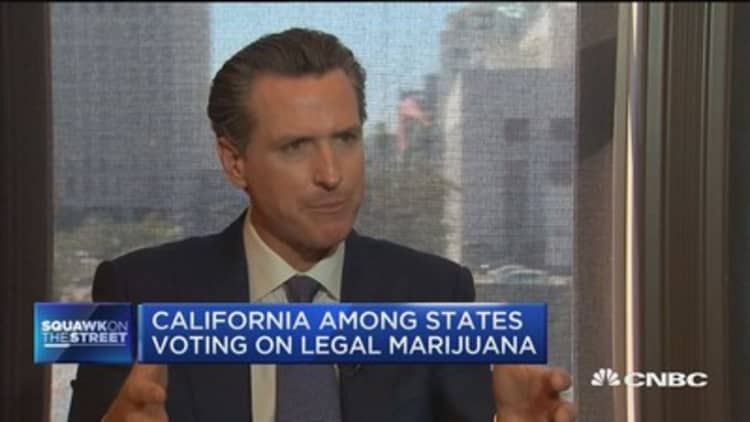State tax initiatives are not as captivating as the race between Donald Trump and Hillary Clinton. However, these measures may affect your financial life more.
Proposed tax increases on vice — in the form of levies on cigarettes, marijuana and soda — will be on the ballot in many states.
Some states will decide whether to raise income taxes on high earners. And even cities, such as Cleveland and Olympia, Washington, have measures on the ballot that would increase income taxes on the wealthy.
Washington state voters will consider a measure Washington, D.C., is reluctant to tackle: a carbon tax.
"There has been an increase in direct democracy when it comes to taxes," said Jared Walczak, a policy analyst with the Center for State Tax Policy at the Tax Foundation.
Here are some of the significant state tax initiatives on the ballot Nov. 8:

Pot taxes in multiple states
Five states have initiatives to legalize and tax cannabis for adult recreational use.
Arizona's Proposition 205 would legalize recreational marijuana and tax it at 15 percent of the retail sale price.
Pot taxes may be high in California too. Proposition 64 would tax legalized, recreational marijuana in California at $9.25 per ounce of flowers and $2.75 per ounce of leaves. When people buy cannabis at licensed retailers, they would pay 15 percent at the point of retail sale plus the general state sales tax rate of 6.25 percent and local sales tax rate that starts at 1.25 percent and runs as steep as 3.75 percent.
Under Question 4, the sale of legal cannabis in Massachusetts would be subject to an additional excise tax of 3.75 percent and allow municipalities to levy an extra tax of up to 2 percent. That is on top of the state's 6.25 percent sales tax.
If Maine voters legalize recreational marijuana with Question 1, they would tax the sale of the product at 10 percent.
Nevada may tax the wholesale value of pot at 15 percent. That is in addition to the state tax rate of 4.6 percent and local sales taxes that can go as high as 3.55 percent.
"This is new territory for many states," Walczak said. He notes that some states where recreational marijuana is legally sold have lowered their taxes to stop the black market in weed from flourishing.
If these ballot initiatives pass, they will add an extra $2.7 billion to legal U.S. marijuana sales in 2018, growing to nearly $8 billion by 2020, according to estimates by Arcview Market Research, a San Francisco-based cannabis research firm.
Other taxes
California
Californians have 17 ballot measures to consider on Election Day. Besides the pot tax, they must also vote on two other tax-related measures:
If voters pass Proposition 55, California would continue to have the highest state individual income tax rate at 13.3 percent, extending a temporary tax that was enacted in 2012.
"Temporary tax increases are very rarely temporary," Walczak said.
Proposition 56 would boost California's cigarette taxes from 87 cents to $2.87 per pack. If enacted, California would impose the ninth-highest cigarette tax in the country, according to the Tax Foundation.
Local tax measures abound in the Golden State too.
San Francisco, Oakland and Albany residents will consider an excise tax on sugar-sweetened beverages at a rate of 1 cent per ounce. Los Angeles, Sacramento and San Francisco residents will vote on a half-cent sales taxes for transportation. San Diegans also will decide on raising taxes on marijuana and on hotel stays to pay for a new football stadium.
Colorado
Residents of Colorado will have to make a big decision about their taxes and their health care.
Amendment 69 would levy a 10 percent payroll and income tax to fund a new public health-care system, called ColoradoCare. Those taxes would be on top of the state's existing 4.63 percent single-rate individual income tax.
"This proposal is unusual and unprecedented among the states," Walczak said.
Maine
Maine may become less tax-friendly for top earners after Election Day.
Question 2 would increase the state's top individual income tax rate from 7.15 percent to 10.15 percent for incomes above $200,000. That would be the second-highest state income tax rate in the country, behind only California.
Washington state
Initiative 732 would impose a first-in-the-nation carbon tax at an initial rate of $15 per metric ton of carbon emissions.
The tax would rise to $25 per ton the subsequent year and by inflation plus 3.5 percent each year thereafter. The carbon tax measure would reduce the sales tax rate from 6.5 to 5.5 percent over two years.
"The carbon tax initiative is very aggressive and other states will be watching to see how voters react to it," Walczak said.
Washington state voters will also decide on whether to raise sales tax by 0.5 percent, increase motor vehicle excise taxes by 0.8 percent and boost property taxes by 25 cents for each $1,000 of assessed valuation.
Olympia residents will vote on a 1.5 percent local income tax to establish a college grant program within the city. However, if the measure passes, it may be subject to legal challenge since Washington state law prohibits local income taxes.


